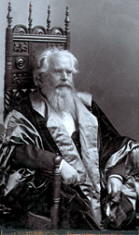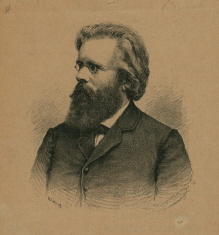|
|
Albert Becker (Composer) |
|
Born: June 13, 1834 - Quedlinburg, Germany
Died: January 10, 1899 - Berlin, Germany |
|
Albert (Ernst Anton) Becker was a German composer of some distinction from of the Romantic period. He was first a pupil of Bönicke in Quedlinburg, studied composition in Berlin with Siegfried Wilhelm Dehn from 1853 to 1856.
Albert Becker became teacher of composition at Scharwenka's conservatorium in 1881, and in 1891 was appointed director of the Domchor. He taught composition at the Akademie der Künste. His most famous pupil was Jean Sibelius, who studied with him counterpoint from 1889 to 1890. In 1890 he became director of the Königlichen Hof- und Domchor. In 1892 he rejected an invitation by the Kaiser to become Thomaskantors in Leipzig as a follower of Wilhelm Rust.
Albert Becker's first great mark as a composer was made by his symphony in G minor, to which the prize of the Gesellschaft der Musikfreunde in Vienna was awarded in 1861. In 1877 some of his songs, notably opp. 13 and 14, to words from Wolfi's Rattenfänger and Wilder Jager, attracted much attention and soon afterwards, in 1878, a Mass in B flat minor was produced by the Riedelsche Verein. Other important works are listed below. In sacred music, in which Albert Becker won his chief success, his style is broad and dignified, without losing sight of beauty and originality in his themes. In chamber music, a quintet for piano and strings, op. 49, is the most remarkable of his works; several pieces for violin and orchestra, such as op. 70 and op. 86, one very effective work for violin and organ, op. 66, a fantasia and fugue for organ, op. 52, and an opera, Loreley, in manuscript, may be mentioned. |
|
Works |
|
Messe in b-moll (1878)
Reformationskantate op. 28 (1883)
Selig aus Gnade Kirchenoratorium (1890)
Cantata Her wie 1ange, op. 73
Weihegesang op. 74
Psalmen für 8-stimmigen Chor a cappella
- Aus der Tiefe rufe ich (Psalm 130) op. 62
- Du Hirte Israels, höre (Psalm 80) op. 89, 2
- Gott, sei mir gnädig (Psalm 51) op. 83, 3
- Hilf mir, Gott! (Psalm 54) op. 68
- Ich hebe meine Augen auf (Psalm 121) op. 89, 1
- Lobet den Herrn (Psalm 147) for double choir unaccompanied, op. 32, 1
- Psalm 104, op. 85
Motets and other sacred voca1 pieces, among wbich the set of Geistlicher Lieder, op. 51, contain some songs that are extremely beautiful. |

 |
|
Source: German Wikipedia Website, English translation by Aryeh Oron (April 2006); Grove’s Dictionary of Music and Musicians (1952 Edition; Author: J.A. Fuller Maitland)
Contributed by Aryeh Oron (April 2006) |
|
Use of Chorale Melodies in his works |
|
Title |
Chorale Melody |
Year |
|
Aus tiefer Not (Phrygian) contained in the Reformations-Cantate Op. 28 for soloists, choir, orchestra and organ |
Aus tiefer Not schrei ich zu dir |
1883 |
|
Gib dich zufrieden und sei stille , for chorus, Op. 55/2 |
Gib dich zufrieden und sei stille |
|
|
Links to other Sites |
|
Albert Becker (Komponist) (Wikipedia) [German] |
|
|
Bibliography |
| |
|
|